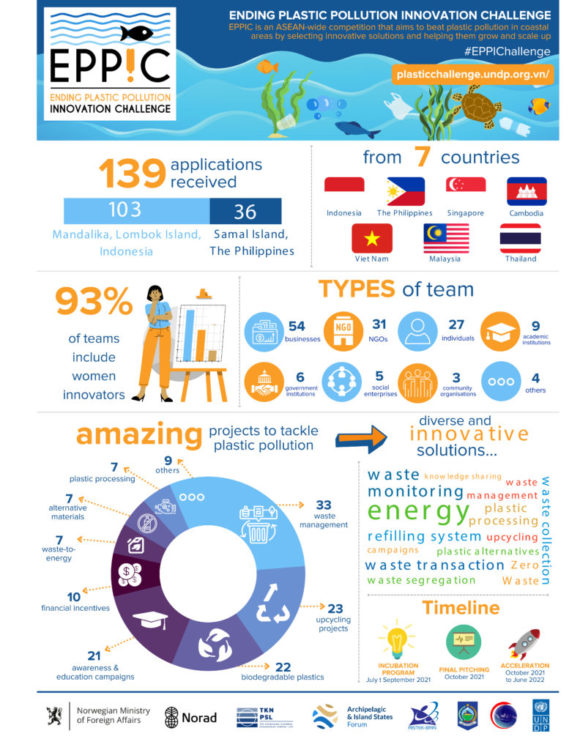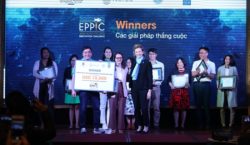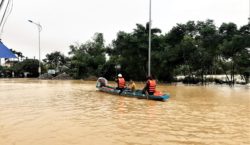
Over 140 innovators joined the United Nations Development Programme’s (UNDP) innovation challenge to combat plastic pollution in the Asia-Pacific region according to this Press release. From the group of innovators, 18 finalists were selected from seven countries – Indonesia, the Philippines, Singapore, Cambodia, Viet Nam, Malaysia, and Thailand.
To help address the worsening plastic problem, UNDP launched the Ending Plastic Pollution Innovation Challenge (EPPIC) Phase II early this year with support from the Norwegian Ministry of Foreign Affairs and the Norwegian Agency for Development Cooperation (Norad). EPPIC seeks to find innovative ways to fight ocean plastic that are under development but lack the support or visibility to grow. For this year’s challenge, the proposed solutions will be piloted in two high-traffic sites, the Mandalika, Lombok Island in Indonesia, and Samal Island in the Philippines; with the ambition to scale up innovations.
In the Philippines, up to 60 billion plastic sachets are used each year, with Samal Island generating approximately 15,000 tons of wastes annually. In Indonesia, the annual waste generation is estimated to be up to 6.8 million tons, with Mandalika, Lombok Island’s total household waste generation reaching 215.7 tons per year (during the pandemic) and the tourism sector contributing more than 13,731 tons/year before the pandemic. Both sites had high-foot traffic of tourists before the COVID-19 pandemic. Among the most common types of waste generated in both islands are PET bottles and other plastic food packaging.
“The portfolio of solutions that have been collected through this competition can be a reference and trigger for the Indonesian innovators because they can see what has been applied in other ASEAN countries then try to implement them in Indonesia, and vice versa. Indonesia also already has innovations that can be applied to neighboring countries, considering that the plastic problems we face are similar,” said Nani Hendiarti, Deputy for Environment and Forestry Coordination on Coordinating Ministry of Maritime Affairs and Investment of the Republic of Indonesia.
The EPPIC Finalists will join a three-month incubation program in the Philippines and Indonesia to be delivered by business incubators starting in July 2021. They will undergo extensive training on various topics such as the circular economy, impact measurement, the Sustainable Development Goals, marketing, and crowdfunding as well as leveraging financial support and accelerating their networks. The EPPIC Finalists will have the chance to improve their proposed solutions to maximize their impact and tailor their ideas to the local contexts.
“There is a growing innovation space in the Philippines that can potentially offer long-term solutions to the plastic crisis we are facing today. But these ideas do not just evolve overnight. They emerged from the painful experiences and common people’s reaction of facing that plastic is wrongly disposed of. Therefore, there is a need for a proper venue and robust support to nurture, grow and design models that can capture this daily distress and transform it into a systemic response to the challenges of plastic pollution and ultimately promote the circular economy as a way of life,” said Enrico Gaveglia, UNDP Philippines Deputy Resident Representative.
According to Mayor Al David Uy of Samal Island, this partnership with UNDP is a “great leap forward to improve their initiatives to address the plastic problem within an island community like Samal”.
The top four winners will be selected on October 2021 during the EPPIC Final Pitching Competition, where each of them will receive USD 18,000 in equity-free seed funding to implement their proposed solutions over the nine-month impact acceleration process in Lombok and Samal Island
The complete list of finalists can be found here.



